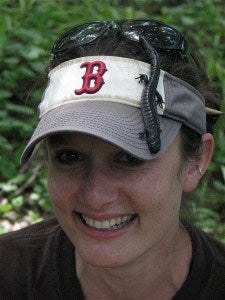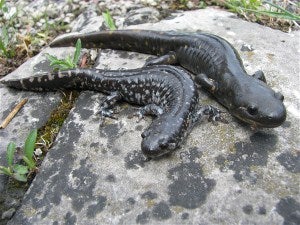 Ambystoma Reproductive Strategies
Ambystoma Reproductive Strategies
PI: Katy Greenwald (Eastern Michigan)
Summary: My research focuses on the evolution and ecology of a unique group of animals: the unisexual (all-female) salamanders of the genus Ambystoma. These salamanders use a unique mode of reproduction, known as kleptogenesis, which likely originated 5 million years ago. Rather than being “normal” animals with two sets of chromosomes (one from each parent), they generally have three sets, but can have four or even five. They are all female, but can “steal” sperm from males of co-occurring species. Sperm genomes are often discarded (resulting in asexual reproduction), but may occasionally be incorporated into resulting offspring.  This results in numerous genome combinations (known as biotypes), which can include genomes from up to five different sexual species. It is unknown whether this sperm genome incorporation is random, or whether it is potentially an evolutionarily adaptive trait. It is also unknown how the presence of the unisexual salamanders affects the co-occurring sexual species. My research program aims to determine whether unisexual females preferentially incorporate genomes from certain types of males. I am also interested in the relative fitness and ecological interactions of unisexual females and sexual species.
This results in numerous genome combinations (known as biotypes), which can include genomes from up to five different sexual species. It is unknown whether this sperm genome incorporation is random, or whether it is potentially an evolutionarily adaptive trait. It is also unknown how the presence of the unisexual salamanders affects the co-occurring sexual species. My research program aims to determine whether unisexual females preferentially incorporate genomes from certain types of males. I am also interested in the relative fitness and ecological interactions of unisexual females and sexual species.
Relevant Links:
Katherine R. Greenwald
Associate Professor
Department of Biology
Eastern Michigan University
441 Mark Jefferson
Ypsilanti, MI 48197
Phone: 734-487-3266
www.ambystoma.net
Return to Research Projects list
